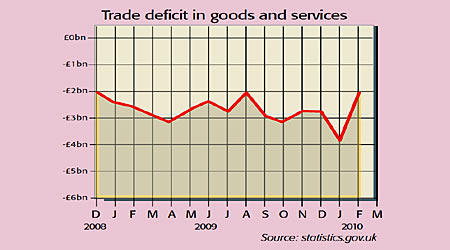
The political parties launched their manifestos this week against a backdrop of mildly improving data that still point to a lacklustre recovery. The trade deficit in goods and services shrank to £2.1bn in February, the lowest since late 2008, while the goods deficit fell to £6.2bn – the smallest monthly total since October 2006. Like-for-like retail sales growth jumped to 4.4% year-on-year in March, said the British Retail Consortium, although it noted that sales would have been half as good without the boost from an early Easter.
There was more evidence the house-price bounce of the past few years is running out of steam. A net 9% of surveyors at the Royal Institution of Chartered Surveyors reported house-price rises last month, the lowest figure since last summer. Sales instructions are climbing and new buyer enquiries are down.
What the commentators said
Britain needs “an export charge”, said Ian Campbell on Breakingviews. But “it simply hasn’t got one yet”. Export volumes rose by just 1.5% in the three months to March compared to the previous three months, while imports jumped by 3.8%. And as Colin Ellis of Daiwa Europe pointed out, the overall level of exports was unchanged from December, with the weather-induced decline in January now reversed. The trade deficit has been flat for a year, and it isn’t helping that our biggest export market, Europe – which accounts for over 50% of our foreign sales – has stalled.
While the external sector seems unlikely to boost growth any time soon, the domestic economy also looks weak.
The subsiding housing market will do nothing to boost consumer confidence, while there are other reasons to conclude that the “upside is still limited” in the retail sector, as Howard Archer of IHS Global Insight put it. Highly indebted consumers “face headwinds with unemployment remaining high and fiscal tightening on the way”, said Hetal Mehta of Ernst & Young Item Club.
On the latter subject, we’ll have to wait a few weeks “to find out exactly what form the pain will take”, said David Wighton in The Times. The election has created a “conspiracy of silence” on the subject of “nasty tax rises and spending cuts” required to fill the chasm in the public finances. Instead, we’re getting “fire-fights” over tax proposals worth a few billion while the deficit is almost £170bn, said Campbell. Politicians are especially loath to talk about cuts because the recovery is so fragile that the fiscal squeeze needed to appease markets increases the odds of it stalling. This election may be taking place on a “peak between dips”.